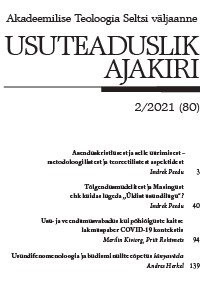Usundifenomenoloogia ja budismi nullteeõpetus śūnyavāda
Phenomenology of Religion and Buddhist śūnyavāda
Author(s): Andres HerkelSubject(s): Indian Philosophy, Philosophy of Religion, Phenomenology
Published by: Akadeemiline Teoloogia Selts
Keywords: Frederick Streng; Nāgārjuna; śūnyatā; religious experience;
Summary/Abstract: Frederick Streng published the first English translation of Nāgārjuna’s Mūlamadhjamakakārikā with his study Emptiness (1967). This is a rare examination of Nāgārjuna as a Buddhist philosopher in the context of religious apprehension. While the mythical structure of religious apprehension is evident in Brahmanic sacrifice and the intuitive structure in the early upanishadic philosophy, Nāgārjuna is master of „dialectical structure“ based on śūnyavāda („zero way“). However, Nāgārjuna is oftenly considered as a predecessor of modern philosophy but first of all he was a Buddhist. Therefore Streng’s approach is valuable. Religious meaning of emptiness and „ultimate transformation“ expands the scope of religious studies. Some excerpts of Mūlamadhjamakakārikā are included for better understanding of how experience of the voidness of all existing arguments may generate religious feeling.
Journal: Usuteaduslik Ajakiri
- Issue Year: 2021
- Issue No: 2 (80)
- Page Range: 139-154
- Page Count: 16
- Language: Estonian

